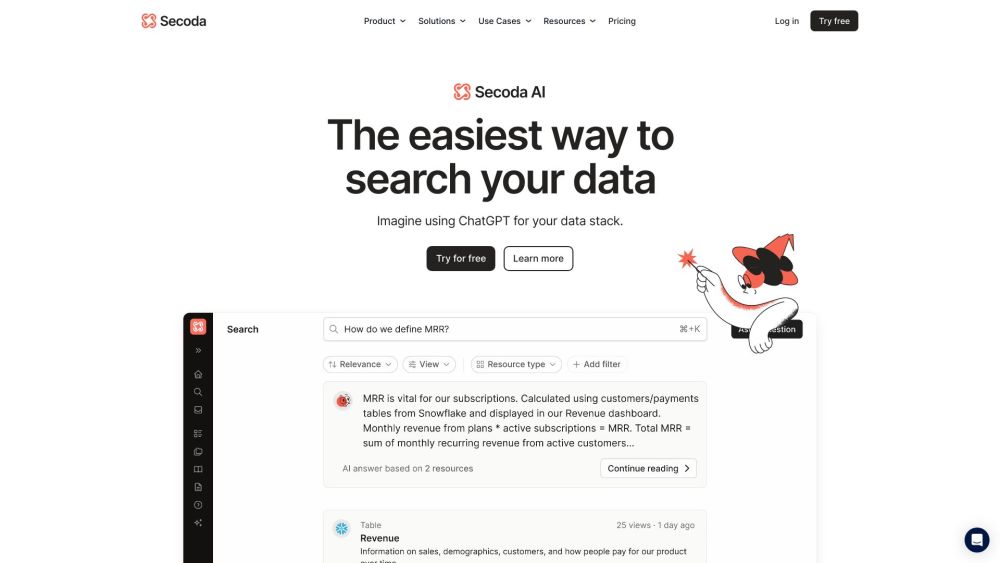Secoda: AI Data Management, Discovery, Cataloging, Lineage, Documentation
Secoda: AI-powered platform for seamless data discovery, cataloging, lineage, and documentation. Empower analytics engineers to search, understand, and utilize data efficiently.


Understanding Secoda
Secoda is an advanced AI-driven platform designed for managing, discovering, cataloging, and documenting data. It provides robust tools for analytics engineers and modern data teams to streamline their workflows, enabling efficient data search, comprehension, and utilization.
Getting Started with Secoda
Key Features of Secoda
AI-Powered Contextual Search
Comprehensive Data Cataloging
Visual Data Lineage
Extensive Data Dictionary
In-depth Data Analysis Tools
Efficient Data Sharing Capabilities
Streamlined Data Ticketing
Granular Data Access Management
API-First Design for Modern Workflows
Practical Applications of Secoda
Enhanced Data Discovery and Knowledge Sharing
Accelerated Data Onboarding and Improved Data Literacy
Increased Data Visibility and Governance
Facilitated Collaboration Between Data and Business Teams
Proactive Impact Analysis Through Automated Data Lineage
Self-Service Data Access for Business Users
Efficient Metadata Management and Documentation
Empowered Self-Service Business Intelligence
-
Secoda Support and Contact Information
For support, visit Secoda's Contact Page.
-
About Secoda
Secoda, Inc. is dedicated to revolutionizing data management. Learn more on Secoda's About Page.
-
Secoda Login
Access your account at Secoda Login Page.
-
Secoda Pricing
Explore pricing options on the Secoda Pricing Page.
-
Secoda on YouTube
Watch tutorials and more on the Secoda YouTube Channel.
-
Secoda on LinkedIn
Follow Secoda on LinkedIn.
-
Secoda on Twitter
Stay updated via Secoda's Twitter.
-
Secoda on Instagram
See what's new on Secoda's Instagram.
Frequently Asked Questions (FAQ)
What is Secoda?
Secoda is a sophisticated AI-driven platform designed for comprehensive data management, including discovery, cataloging, lineage, and documentation. It is built to aid data teams in efficiently navigating and leveraging their data resources.
How do I use Secoda?
Begin by signing up and logging in to Secoda. Connect your data sources through integrations with various data warehouses and BI tools. Utilize Secoda’s AI-enhanced search to explore your data, generate documentation, submit data requests, conduct analyses, and manage permissions.
What advantages does a data portal offer?
Secoda’s portal enhances data literacy, streamlines data onboarding processes, and provides superior visibility and governance over your data assets.
Does Secoda offer an API?
Yes, Secoda provides an API for accessing functionalities like documentation, cataloging, and data lineage.
Can Secoda integrate with Okta or Active Directory?
Yes, Secoda supports integration with Okta and Active Directory for managing user permissions and access control.
Which data warehouses are compatible with Secoda?
Secoda integrates seamlessly with popular data warehouses including Snowflake, BigQuery, Redshift, Databricks, Postgres, Oracle, Microsoft SQL, MySQL, and S3.
Which BI tools are supported by Secoda?
Secoda supports integration with BI tools such as Tableau, Looker, Metabase, Redash, Mode, Sigma, Power BI, and Google Data Studio.
Is Secoda compatible with dbt?
Yes, Secoda works with both dbt Cloud and dbt Core, supporting YAML file information, tests, tags, metrics, and detailed column-level lineage.
Does Secoda automate data lineage?
Secoda automates the visualization of data lineage at the column and table levels, incorporating tests, events, and ETL processes. Users can also enhance lineage manually via the API.
Does Secoda offer data monitoring or quality features?
Secoda does not include native data monitoring or quality assurance features but can integrate with tools like Great Expectations and dbt tests to provide data monitoring within its lineage interface.
Does Secoda support Git integration?
Yes, Secoda integrates with Git, providing version control for changes made within Secoda, including rollbacks and change reviews.
What metadata can Secoda extract?
Secoda extracts detailed metadata about your data, including resource names, usage popularity, lineage, query history, descriptions, and frequent usage patterns.